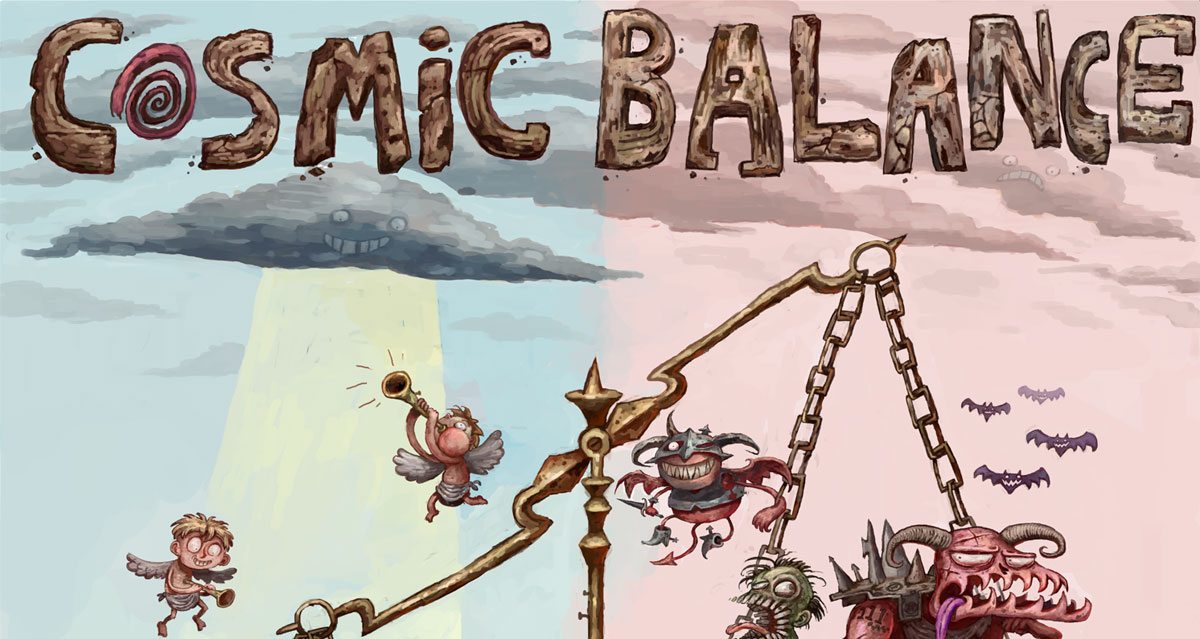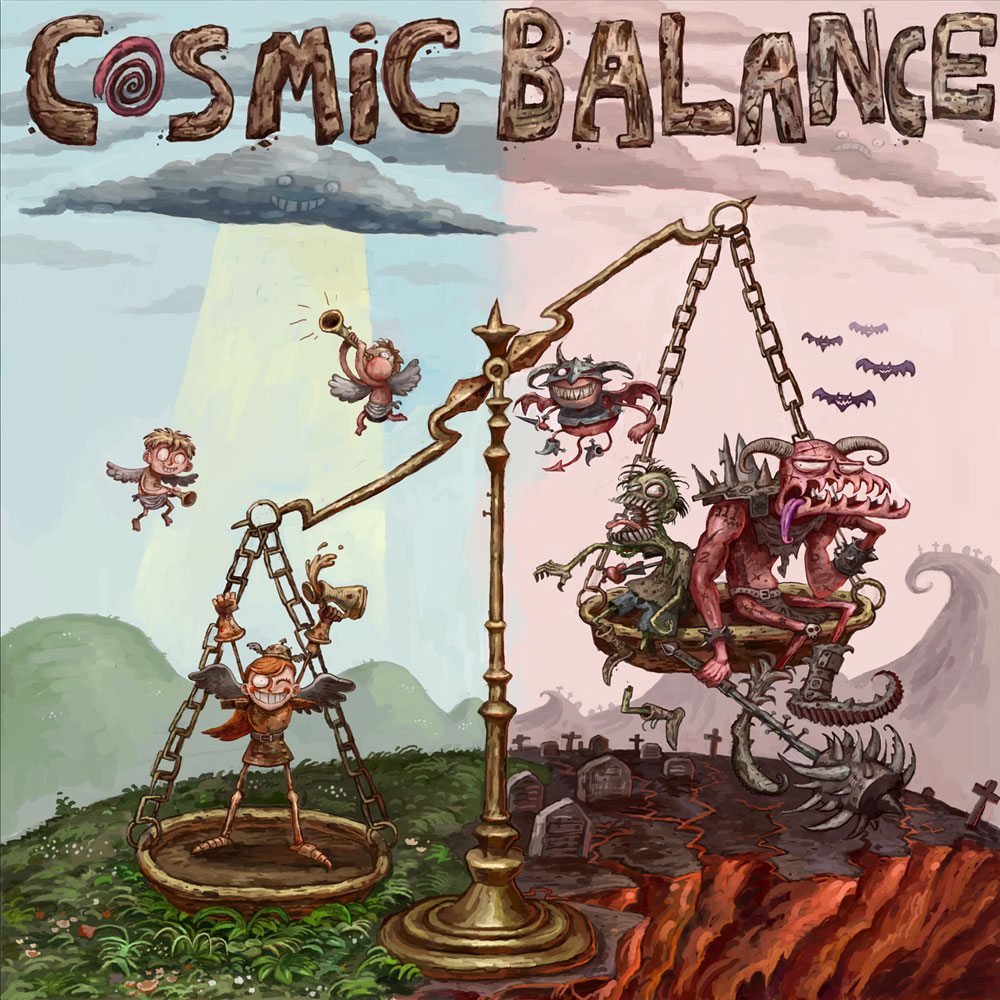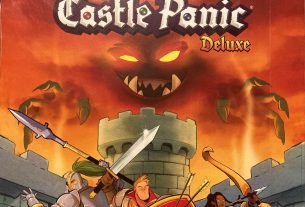The gods are at war, leading their minions into battle and sending their vanquished foes to Heaven or Hell—tip the Cosmic Balance and you open up the gates, releasing Angels and Demons into the fray.
At a glance: Cosmic Balance is a game by Alexandra and Brian Tinsman for 2 to 5 players, ages 12 and up, and takes about an hour to play. It’s currently seeking funding on Kickstarter, with a pledge of $49 for a copy of the game. The game had some flavor text that would be PG-13, but I’ve been told they’re toning it down a little; as far as the complexity, I was able to play with my 9-year-old and she was able to play it without too much trouble.
New to Kickstarter? Read our crowdfunding primer.
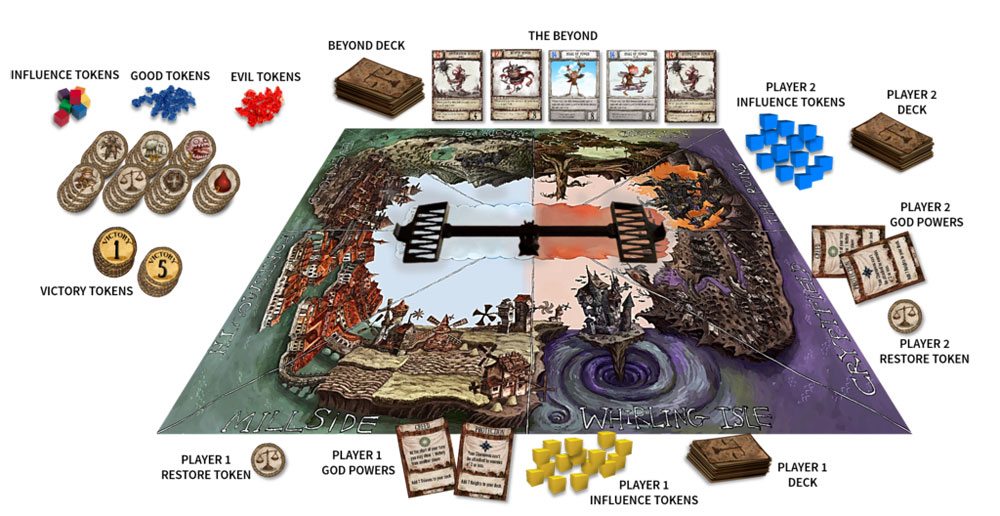
Components:
- 1 game board
- 1 Cosmic Balance scale
- 35 Victory Point tokens (in denominations of 1 and 5)
- 30 Evil tokens
- 30 Good tokens
- 38 Battle tokens
- 210 Cards (God Powers, Filthy Peasants, Factions, Angels, and Demons)
- 50 Influence tokens (10 each in 5 colors)
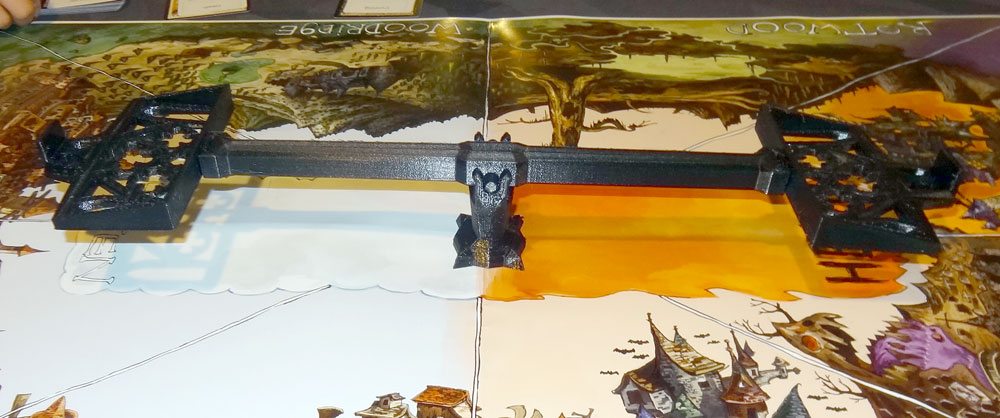
My review is based on a prototype, so most of the components did not have final artwork and many of the components were printed on paper rather than cardboard. (The cards themselves were simply Magic cards with printed labels stuck to them.) The Cosmic Balance scale in the prototype is a black 3D-printed scale rather than molded plastic—the pledge levels will let you choose between red (evil) or blue (good), with a higher pledge level to get 3 copies of the game, with one scale each in red, blue, and black. The scale breaks down into four parts–the two platforms at the end detach from the arm.
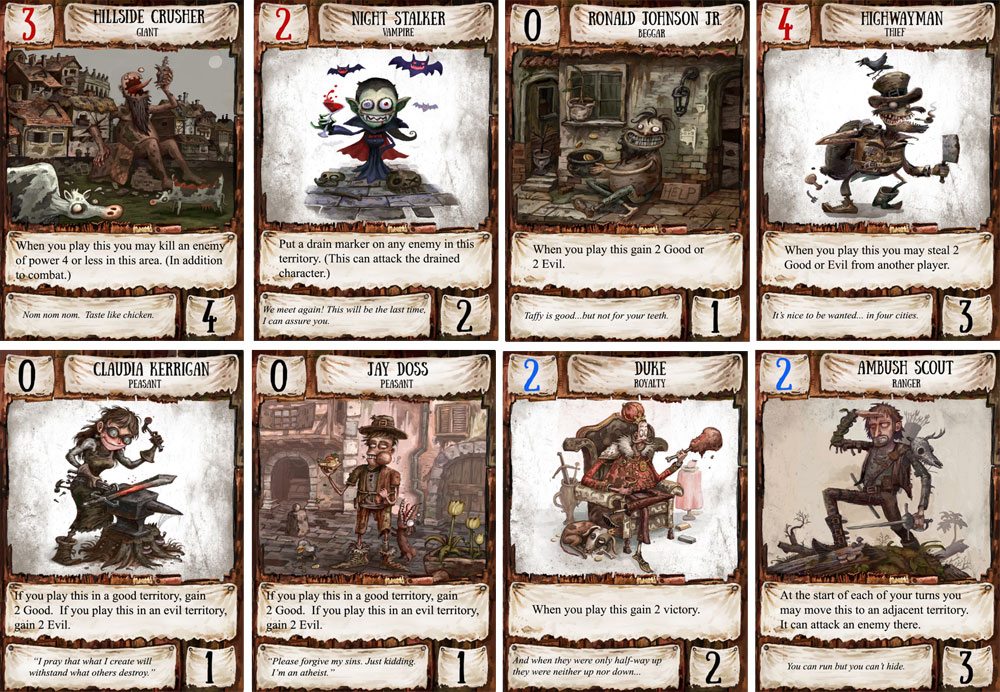
The artwork is by Lars Nielsen, and it has a wonderful, kooky look to it, with characters that look like they’d fit in a Roald Dahl book. The Filthy Peasants do indeed look filthy, and the various faction characters are a lot of fun. That, and all of the cards will have flavor text on them. One of my kids’ favorite bits was looking at the prayers of the Filthy Peasants and seeing how all the characters tied into each other. (The Filthy Peasants are all entirely equivalent in gameplay, but they have unique names and prayers for their flavor text.)
The board itself is really huge, 31″ x 20″. I don’t know if it necessarily needs to be quite that big, but the Cosmic Balance sits in the center of the board and you end up putting a lot of cards in the territories. Just be sure to have plenty of table space when you play.
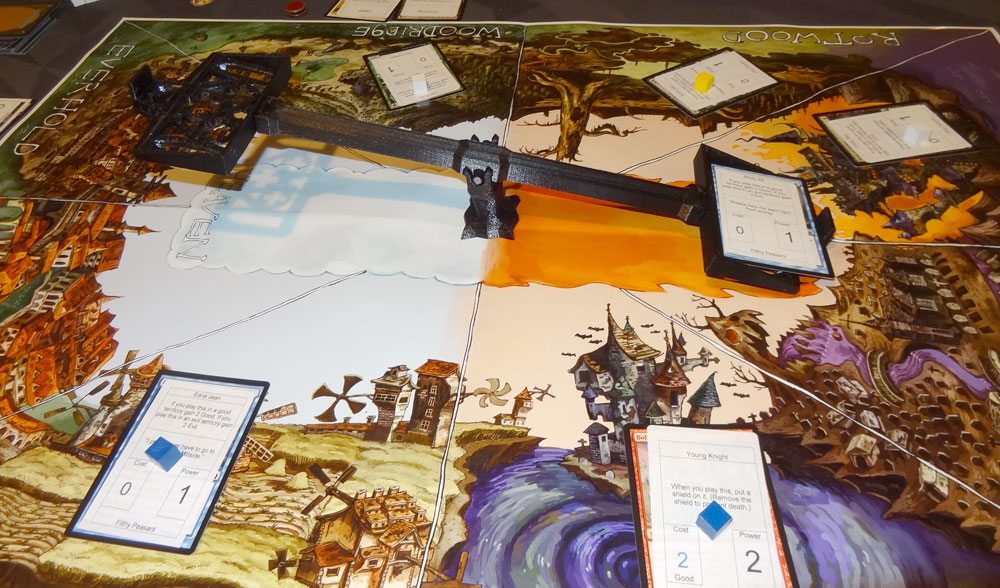
How to Play
You can download a PDF of the rulebook here. I will note that the rulebook isn’t final, and there were some places where things were a little ambiguous or not well-defined: for instance, they used the term “mortals,” which I assumed meant the characters from your own deck, but it turns out it includes Angels and Demons, too. I have given some feedback on the rulebook and hope that the final rulebook will be more clear about everything.
The goal of the game is to score the most victory points, which you get by controlling territories and (in the right circumstances) by controlling Angels and Demons.
To set up, the board is set up with the Cosmic Balance in the center. Good and Evil tokens are placed in a supply, as well as a pool of victory point tokens (based on the number of players), and the Battle tokens. Shuffle the Beyond cards, and deal 5 face-up next to the board, placing the deck to one side.
Each player takes the influence cubes of one color, 10 Filthy Peasant cards, a Restore Balance token, and 3 God Power cards. Choose two of the three God Power tokens to keep and discard the third, placing them on the table in front of you. Each God Power lists a Faction: your starting deck will consist of your Filthy Peasants plus those two Factions. To begin, pull out 2 Filthy Peasants for your hand, shuffle your deck, and then draw 2 more cards.
On each turn, you get 3 actions. Plus, if you cause the balance to tip down (touching Heaven or Hell), you get an additional action. An action is drawing 1 card from your deck, or playing 1 card from your hand onto the board. Some God Powers provide additional abilities that require actions to use.
When you play a card onto the board, you place it into a territory of your choice with one of your influence cubes on it, and then you may attack one other unit in that same territory if you wish. Filthy Peasants have no token cost to play, and will allow you to take 2 Good or 2 Evil tokens from the supply, depending on which half of the board they’re on. Faction cards have a cost, either in Good or Evil: you must pay that amount to the supply in order to play the card. Most Faction cards also have special abilities that take effect when you play them.
If you choose to attack another unit, compare the powers of the two units. If yours is greater, you kill the other unit. If there’s a tie, they both kill each other. When you kill a card, you get to send it to Heaven or Hell, placing it on the scale and then claiming a Good or Evil token (based on where you sent it). You’re allowed to attack and kill your own cards in order to get more Good and Evil tokens and to add cards to the scale.
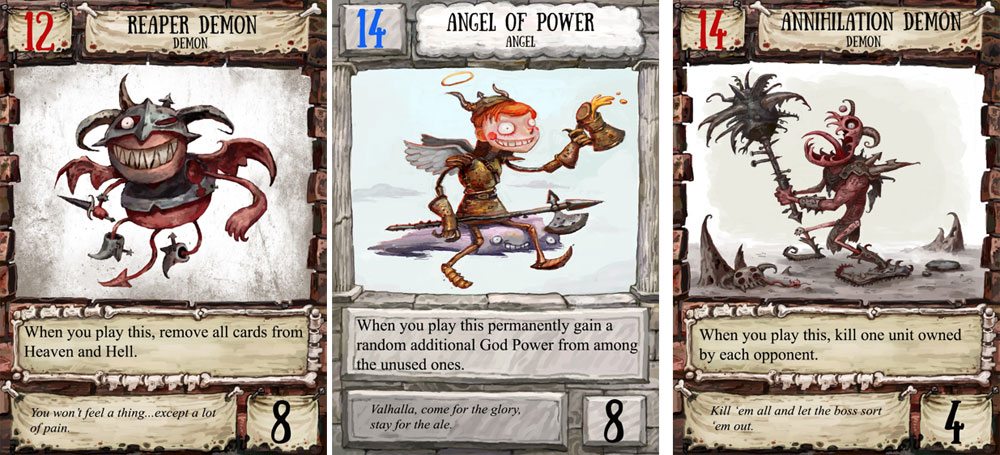
The Beyond has Angel and Demon cards—there are always 5 face-up next to the board, and they can be played by any player by paying the Good or Evil cost, without costing an action. Angels and Demons cost a lot, though, because they are very powerful, and can also be worth victory points. You can, however, get a discount on them: if the scale is touching Heaven, then Angels can be played for half the price; if the scale is touching Hell, Demons are half-price. Just like your own cards, when you play an Angel or Demon, you mark it with one of your influence tokens.
At the end of your turn, you score victory points: one for every territory you control (i.e., you have more tokens in it than any other player). You also score 1 point per Angel you control if the scale is touching Heaven, or 1 point per Demon you control if the scale is touching Hell. Take victory point tokens from the pool—if it runs out, the game end is triggered but you use additional tokens from the box if more points are scored.
The Restore Balance token may be used one time during the game to remove all the cards from the scale and discard them, rebalancing the scale.
The game continues until either the pool of victory point tokens runs out, a player runs out of cards, or the Beyond deck is exhausted. Finish the round (so each player has had the same number of turns), and then compare final scores. Highest score wins.

The Verdict
Cosmic Balance is a game with a gimmick—the card scale—but it’s a pretty fun gimmick, and there’s actually a good game built around it. The area control portion of the game reminds me a little of Small World: you score on each turn for the territory you control, so even if you can’t hold territory for long, you can still score points for it. One of the differences, though, is that multiple players can coexist in a single territory—but you only score if you outnumber your opponents. So if you can slowly build up tokens around the board, eventually you can score a lot of points simply by outnumbering people instead of fighting them.
The balance is intriguing. Early in the game, it can be easy to tip the scale back and forth, since it will tip down with the first card placed in it. But if one side gets loaded up with a lot of cards, it can take a lot of effort to overcome that imbalance, so you’ll want to make good use of your Restore Balance token. The scale affects several things: first, you get Good or Evil tokens for sending things to Heaven or Hell, respectively; second, you can earn an extra action if you cause it to touch down on your turn; third, it affects the price of Angels and Demons; finally, its position can give you extra points for Angels or Demons.
If somebody has an Angel on the board, it’s important either to eliminate the Angel or tip the scale toward Hell before that player’s next turn. Of course, those Angels can be hard to defeat—unless you can bring in your own card from the Beyond.
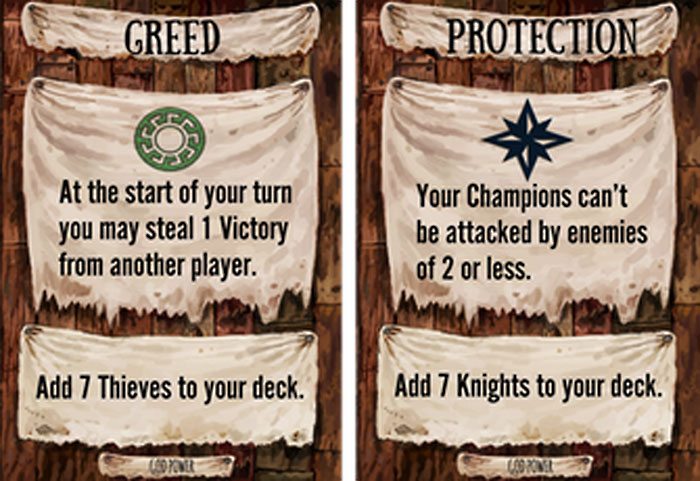
Another interesting factor is that your Faction cards will require either Good or Evil tokens to play. Depending on the God Powers you chose to keep, you may want to collect some of each, or you may focus on just one side. There are advantages and disadvantages to both, but your choice will affect where you want to play your Peasants (which aren’t great for combat but are mostly used for harvesting Good and Evil tokens), and where you will want to send units that you kill.
I do like the mix of God Powers and Factions—there’s a fun mix of them, and they play differently. There are interesting combinations, too. In that sense, setting up is a little like Smash Up: you pick two Factions and smash them together (along with your Filthy Peasants). But, like Smash Up, some combinations are more powerful than others—I’m hoping that the designers will continue to make some tweaks to bring these back into balance (and have given them some feedback to that end). But I do like the way that playing the game feels different depending on your powers.
We had one game in which one player looked far behind: he had barely scored any points while the other two players had each scored a moderate number each turn. But then in one turn he managed to place several units, including his most powerful Knight, which placed shields on all of his units—essentially an extra life. The other two players had a hard time killing all of those off, and he was able to pull off some huge scores several turns in a row, winning the game. That particular combination had a slow build, but it paid off in the end. Figuring out a good synergy among your Faction units is key, as is knowing when to spend your tokens on your own units and when to save up for a powerful being from the Beyond.
Overall, I’ve been enjoying Cosmic Balance, and most of the people I’ve played with (kids and adults) have gotten a kick out of it, though we did have one session that seemed a little one-sided. That is probably the hardest part about designing this sort of game: figuring out how to balance a lot of asymmetric powers. One player remarked that the game is maybe trying to do too many things at once, and maybe would be better if it had fewer powers and factions to choose from, but I know there are also players who want as much packed into a game as possible. The rules are not too complex (the most complicated thing may be keeping track of how many actions you have left) but the Factions and God Powers will change the feel of the game each time you play.
For more information or to pledge for a copy of the game, visit the Cosmic Balance Kickstarter page.
